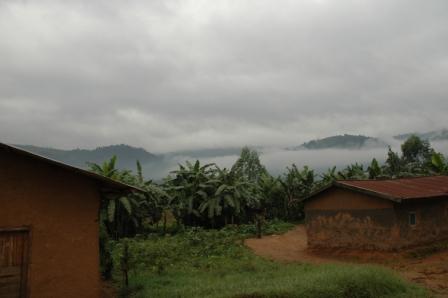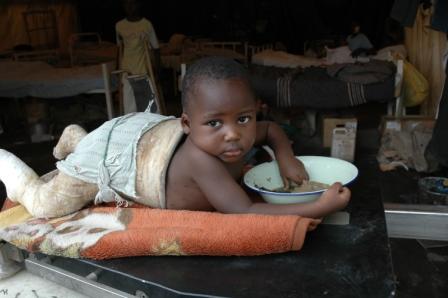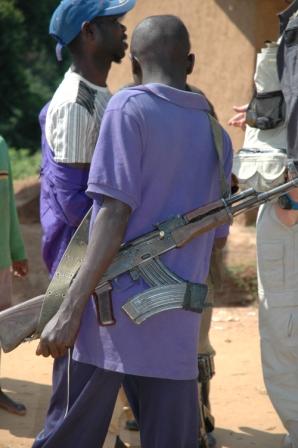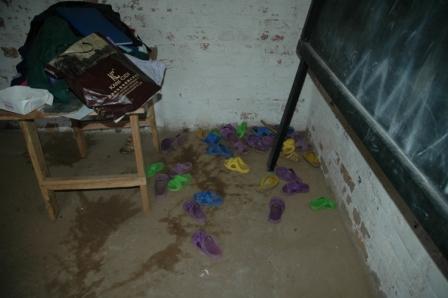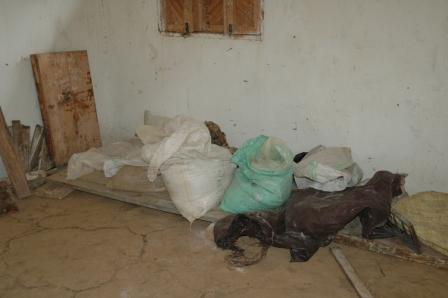CONGO: Candidates Silent On Resource War In Congo
"There is much worry in the Democratic Republic of Congo.
Especially in the eastern part, I think the WAR is too much Once more,
for more than a week, the rebel Nkunda has been attacking villages near
Goma, about 2km distant. As usual, the result is that millions of
people are homeless, displaced, starving, injured, some others even
died, and women raped. This is life in the east of DRC."
-- (Email received from Goma, DRC, September 24, 2008)
Image: Broken Baby in Goma (2007)
All politics is local, to paraphrase the venerable Bostonian and
Democratic, Tip O'Neill. To human rights workers, journalists, writers,
and humanitarians who have intimate knowledge of the Great Lakes Region
of Equatorial Africa, this short email conjures a place, people, and
tragedy that has been met with a wall of silence on the campaign trail.
Neither John McCain nor Barack Obama has addressed this great
humanitarian breakdown, except in the context of political squabbling.
After Obama's promise in Israel this year to "never again" allow
genocide to occur, the McCain camp quickly pounced, issuing a press
release saying that if Obama were sincere in that statement, he would
have voted to allow the troop surge in Iraq.
The media immediately published Obama's response: "Well, look, if
that's the criteria [genocide or humanitarian crisis] by which we are
making decisions on the deployment of U.S. forces, then by that
argument you would have 300,000 troops in Congo right now--where
millions have been slaughtered as a consequence of ethnic strife--which
we haven't done."
On the surface, this political exchange of rhetoric seems
straightforward, but upon deeper analysis it reveals the lack of
understanding in the press and the campaigns about what is happening in
the Democratic Republic of Congo (DRC), and by extrapolation, the rest
of the African continent. The press corps missed a glaring error in
Obama's response, and that error is illustrative of the ignorance
America has regarding Africa.
Friends of the Congo issued a strong response to Obama's statement,
objecting to the stereotypical notion that tribal bloodletting is
responsible for this travesty. The United Nations
has termed the humanitarian crisis in Congo the "deadliest in the world
since World War II." Nearly 6 million people have died in the region
since 1996 due to the war and conflict related causes such as treatable
disease, malnutrition and related violence, including the documented
rapes of 200,000 women and children. Doctors Without Borders has consistently reported that the Congo conflict is one of the top ten most under reported stories in the world.
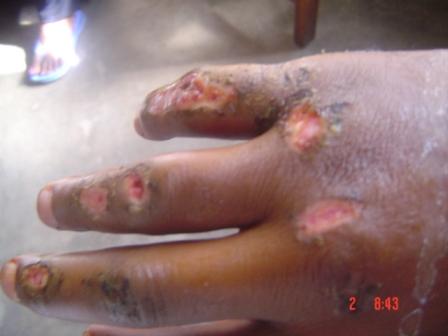
Image: Photo of woman who was tortured by secret police. Emailed to author in 2007
"The central reason for the nearly six million dead in the Congo
since 1996 is not ethnic strife but rather the scramble for Congo's
enormous treasure trove of diamonds, gold, copper, cobalt, coltan, tin,
timber and more," says Maurice Carney of Friends of the Congo.
Carney is not alone. Kenyan Nobel Peace Prize Laureate, Wangari Maathai
has assessed these misconceptions and said "these wars when you look at
them, they are all about resources and who is going to control them."
DRC harbors the richest, purest minerals in the world, many of them
vital to the U.S. defense industry. There is not one person who is
reading this article who does not benefit by mineral extraction and
exploitation in DRC. For example, Congo has from 64%-80% of the world's
reserve of coltan. Oil may arguably be the non-renewable resource which
is front and center in every American's mind, but coltan is found in
cell phones, laptops, digital cameras, and video game consoles. Coltan
is the engine behind our communications systems, and 1500 people a day
are dying in this region while Americans profit from corporate greed,
take Congolese resources, turn our backs, and power-up our cellphones.
Make no mistake about it, there is a violent resource war happening
in Congo and a great wall of silence has been erected around it. While
foreign corporations and American consumers benefit, 1.5 million people
are in IDP (internally displaced persons) camps in Kivu Province alone.
This is the WAR addressed in thee mail that introduced this commentary.
Tim Butcher, Middle East correspondent for the Daily Telegraph writes: "There has not been a single day in post-Saddam Iraq or Taliban-infested Afghanistan when 1,500 souls have perished."
Yet, the candidates are mute during this campaign, seemingly unengaged in Africa's problems.
"Eradicating poverty, particularly in Africa, is the greatest global
challenge facing the world today," read a declaration adopted by the UN
General Assembly Monday evening. Congo has vast reserves of mineral
wealth and the Congolese people are living on the equivalent of less
than one dollar a day.
Image: Congolese School Room
Image: Rat infested bags of ground grain for children
The World Bank has estimated that a whopping 75 % of Congo's copper
and cobalt reserves were basically given away to multi-national
corporations.
Novelist John le Carre (The Mission Song) op-ed in the Boston Globe
"Getting the Congo's Wealth to Its People" explains, "As the deals
presently stand, the main profit Congo state will make is from taxing
the operations and exports of the mining companies. For a minimal
return, it has signed away millions -- if not billions -- of dollars'
worth of copper and cobalt for 35 years."
Both the Democratic and Republican parties have close ties with
questionable mineral extraction both in the United States and in
developing countries. This may or may not explain the lack of dialogue
on the exploitation of Congo's resources.
The UK Guardian reported on September 23 that
Freeport-McMoRan Copper & Gold, appears unaffected by the financial
market meltdown. Freeport has a major new project, the Tenke Fungurume
copper/cobalt operation in Democratic Congo. This project is moving
forward despite longstanding allegations of financial and environmental
abuse in Indonesia, as first reported by the New York Times in 2005.
Last year, Freeport paid off nearly half the debt it incurred from
its takeover of Phelps Dodge in March, 2007. Freeport pulled out of its
base in New Orleans and moved to Phoenix. The acquisition expanded
Freeport's mining assets beyond its copper, gold and silver mining
facility in Papua, Indonesia, to include Phelps Dodge's eight mines in
the western United States, including Arizona, Colorado and New Mexico;
three mines in South America; and the project in the Democratic
Republic of Congo, according to BNet.
Phelps Dodge was tied to McCain's 2000 Presidential run by the Center for Public Integrity.
Phelps Dodge Corporation, a copper mining and manufacturing company,
is the largest copper producer in the United States. It is also
McCain's number ten career patron, according to the Center for Public
Integrity. Phelps Dodge is also a major polluter, ranking number 23 in the "Toxic 100" as ranked by the Political economy research Institute.
A third of all the copper in the United States comes from the Arizona
Morenci mine, making Phelps Dodge the largest copper producer in North
America. In 1996 the San Carlos Apache tribe accused Phelps Dodge of
abusing a water rights agreement.
A compromise agreement required congressional approval, was brokered
by McCain. "We were very successful," a spokesman for Phelps Dodge told
the Center.
At about the same time in 1997, the Austin Chronicle
reported that Ruth Harkin of The Overseas Private Investment
Corporation (OPIC) convinced colorful Freeport Chairman James R.
Moffett to contribute "$100,000 to the Democratic National Committee.
According to Federal Election Commission documents, Freeport-McMoRan
gave the DNC $40,000 on August 26. On September 6, the wives of
Freeport's top executives, Chief Financial Officer Richard Adkerson,
vice chairman Rene Latiolais, and chief investment officer Charles
Goodyear, wrote checks to the DNC totalling $35,000. Four days later,
Moffett's wife Louise wrote a check to the DNC for $2,500." Grand
total? $77,500.
Freeport has donated large sums to several Louisiana universities,
including: $4.1 million to Louisiana State University; $1.1 million to
Loyola, plus an endowed chair in Environmental Studies; and $1.25
million to Tulane. When students from an Environmental Studies program
actively protested Freeport's actions in Indonesia, Freeport CEO
Moffett threatened to take back six hundred thousand dollars which had
been donated for that program, according to an article in New Orleans
Loyola University ''Maroon'' on Friday, April 11, 1997.
Moffett is also legendary for his attempts in 1987 attempt to dump
12 million tons of low-level radioactive gypsum into the Mississippi
River. (SPINNING GOLD
by Robert Bryce, Mother Jones Magazine; September/October 1996)
According to the Center for Public Integrity,
"The top five mining contributors to the political parties in the 2000
and 2002 election cycles -- Peabody Energy, Addington Enterprises,
Freeport-McMoRan, Boich Group, and the National Mining Association --
gave more than $3.4 million, 89 percent of their party donations, to
the Republican national committees and just $809,000 to the Democrats."
Long-term copper markets have soared in recent years on demand from
China and other developing countries building their infrastructure. The
merger of the Phelps Dodge and Freeport created the world's
second-largest copper company, according to the Bloomberg news service.
There is no indication that either candidate has questioned mining
concessions in Africa, as well as environmental and social impacts on
the poorest people in the world.
The rapidly dwindling Congo rainforest, a great source of potential
wealth for the Congolese is now floating down the Congo River on barges
belonging to multi-national corporations. Obama has addressed this
issue.
In a letter to the World Bank on August 17, 2007, Obama questioned the
WB's involvement in DRC and the potential destruction of the
rainforest. "We are concerned that irrevocably destructive logging
practices are currently expanding in the DRC at an alarming rate. We
believe that this policy directly threatens the long term viability of
the local communities that are sustained by the rainforest and
undermines the long-term development of the DRC."
The letter was signed by Obama, Senators Russel Feingold (D-WI),
Olympia J. Snowe (R-ME), Ron Wyden (D-OR), Susan M. Collins (R-ME) and
Barbara Boxer (D-CA).
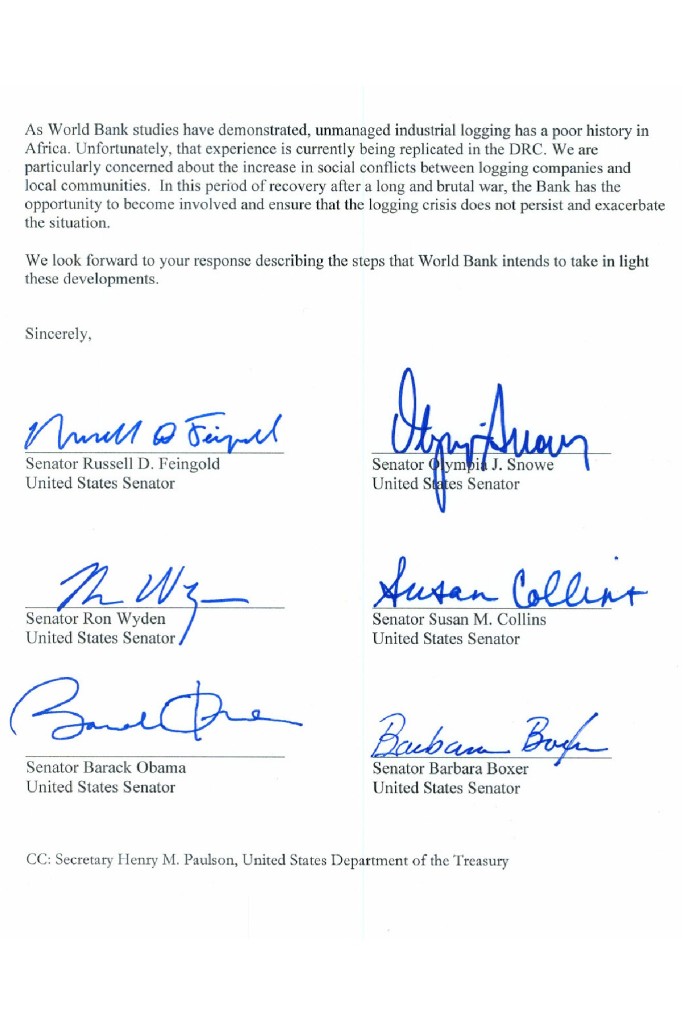
Both McCain and Obama support the International Criminal Court, and this may provide a window to their world view.
The ICC is an independent adjudicator that investigates and
prosecutes international crimes including genocide, crimes against
humanity, and war crimes. The ICC is actively involved in The
Democratic Republic of the Congo, Northern Uganda, the Darfur Region of
Sudan, and the Central African Republic.
The ICC is required to give first opportunity to investigate and
prosecute a case to the nation/state involved, and will step in only
when it concludes the nation is not making a good-faith effort to hold
anyone accountable. So far, it has issued arrest warrants in only three
cases, from Uganda, the Democratic Republic of the Congo and Sudan.
It is assumed that the ICC wants to move against General Laurent
Nkunda in DRC, but to do so would interfere with the cozy relationship
the United States has with Rwanda. Nkunda is believed to be Rwanda's
proxy army in DRC. DRC is strategically important for US access to the
mineral wealth, and Rwanda also has an eye on what Congo has to offer.
Citizens for Global Solutions issued a white paper
on the similarities between the Obama and McCain campaigns on the issue
of whether or not the United States should join the ICC. Believe it or
not, although 106 nations have joined the ICC, the United States has
not, and George Bush has refused to consider membership.
According to Citizens for Global Solutions, "the president has not
only refused to join, but has attempted to undermine the Court's
legitimacy. During his tenure, President Bush has coerced more than 100
countries into signing Bilateral Immunity Agreements (BIAs). These
agreements withhold important financial aid unless the country agrees
never to bring a U.S. service member to the ICC."
Obama and McCain have indicated that they would support the ICC, but
have made no commitments yet as to whether the United States would
become a full member.
According to a September 2008 poll by the Chicago Council on Global
Affairs, 68% of Americans believe that the United States should
participate in the Rome Statute
treaty on the International Criminal Court. The Rome Statute gives the
ICC the authority to try individuals for war crimes, genocide, or
crimes against humanity if their own country won't try them.
Obama appears to be the more reticent of the two candidates. His endorsement of
membership is tepid at best: "The United States should cooperate with
the ICC investigation in a way that reflects American sovereignty and
promotes our national security interests," Obama says.
McCain appears to be much more supportive in his public statements,
but is worried about safeguards. Both he and Democratic
Vice-presidential nominee Joe Biden stood in bi-partisan agreement in
2005 to join the ICC.
"U.S. and allied intelligence assets, including satellite
technology, should be dedicated to record any atrocities that occur in
Darfur so that future prosecutions can take place. We should publicly
remind Khartoum that the International Criminal Court has jurisdiction
to prosecute war crimes in Darfur and that Sudanese leaders will be
held personally accountable for attacks on civilians," McCain said in 2006 in the Washington Post.
What is notable in McCain's response is that satellite imaging
already blankets this region because of strategic interests. One can
actually Google Ugandan "refugee" (activists would say "concentration")
camps in northern Uganda. Darfur is McCain's focus in his public
statements, and the wall of silence remains around Congo.
Kambale Musavuli, a student intern with Friends of the Congo, was at
a National Press Club meeting in Washington on Wednesday.
Representatives from the Obama and McCain campaigns answered questions
about their policies with regard to the DRC.
Musavuli told OffTheBus that the Obama campaign "wants to understand
the root cause of the conflict and learn more about illegal
exploitation of the resources." The Obama campaign also said it wants
the United States to enter the international criminal court system.
The McCain campaign, "spoke more about Darfur and nothing about the
Congo," Musavuli reports. "When asked questions about the Congo, they
did not answer it directly."
"Genocide" is the driving word behind the "popularity" of the slaughter
in Sudan. There are also seemingly clear cut "good guys" and bad guys,
and the Arabs wear the metaphorical black hats in Darfur. Still, half a
million people have died in Darfur vs. 6 million in the last ten years
in DRC. Add to that number 15-25 million Congolese deaths during the
rule of Belgian King Leopold, and the numbers defy imagination.
But pundits are unapologetic about perpetuating the silence surrounding DRC. In June of 2007, Nickolas Kristoff wrote an op-ed which explained why he would not focus on DRC.
"My answer has been that Darfur is a case of genocide, while Congo
is a tragedy of war and poverty. And now that I'm here in Congo, I
think that's exactly right. It's terrible to see kids dying here in
eastern Congo of malaria, malnutrition and simple ailments like
diarrhea. But there is still a big difference. Congo is essentially a
tale of chaos and poverty and civil war. Militias slaughter each other,
but it's not about an ethnic group in the government using its military
force to kill other groups. And that is what Darfur has been about: An
Arab government in Khartoum arming Arab militias to kill members of
black African tribes," Kristoff wrote.
American media has not aggressively investigated the vast oil
reserves under Sudan and its connection to lack of political will in
this conflict. Leopold killed 25 million Africans in DRC because of
greed. Are the deaths of 25 million any less than the deaths of 4
million because "greed' does not equate with "genocide" in the
international lexicon? Or are the numbers just too big for rational
minds to grasp without inducing an intellectual insanity?
Why should the American public care?
According to a GAO report: "In fiscal years 2006 and 2007,
respectively, USDA, DOD, HHS, DOL, State, Treasury, and USAID allocated
a total of about $217.9 million and $181.5 million for the DRC. About
70 percent of the funds supported humanitarian and social development
objectives, and about 30 percent of the funds supported economic and
natural resources, governance, and security objectives."
This is DRC alone and does not reflect the billions spent on the African continent.
The GAO report makes it clear that the bulk of expenditures in DRC
have included emergency supplies, food, water, and sanitation
improvements. Still, 1500 people per day are dying in this region. It
is either a failed program, or the money is not going where it is
allocated. The latter seems to be the obvious possibly. This is not
surprising; given the financial chaos and mismanagement that is
gripping the world's markets. If we cannot keep track of expenditures
on Wall Street, how can we expect to have transparency and
accountability in DRC, where the government is nothing more than a
scrim for Mafioso type skimming of humanitarian and conservation aid?
A Congolese conservation official described the looting of
conservation funding provided by the US Fish and Wildlife Service as
well as Conservation International and other large conservation
organizations as "Hyenas gathering for the kill."
I have written this before, in a column for the Society of
Profession Journalist's Quill Magazine Online. It cannot be said enough.
If 6 million people were killed or simply vanished off the face of
the Earth, you might expect an immediate international outcry, and
in-depth analysis of this humanitarian catastrophe. You'd expect story
to be on the front page of every newspaper and magazine in the world.
You'd expect broadcast and photojournalists to take every opportunity
to document this story. This population represents the number of people
in the State of Colorado or the country of Ireland.
Yet, they, and the candidates remain silent, while "there is much worry in the Democratic Republic of Congo."
All photos except torture image taken by Georgianne Nienaber, DRC (2007)
- 116 Human Rights
